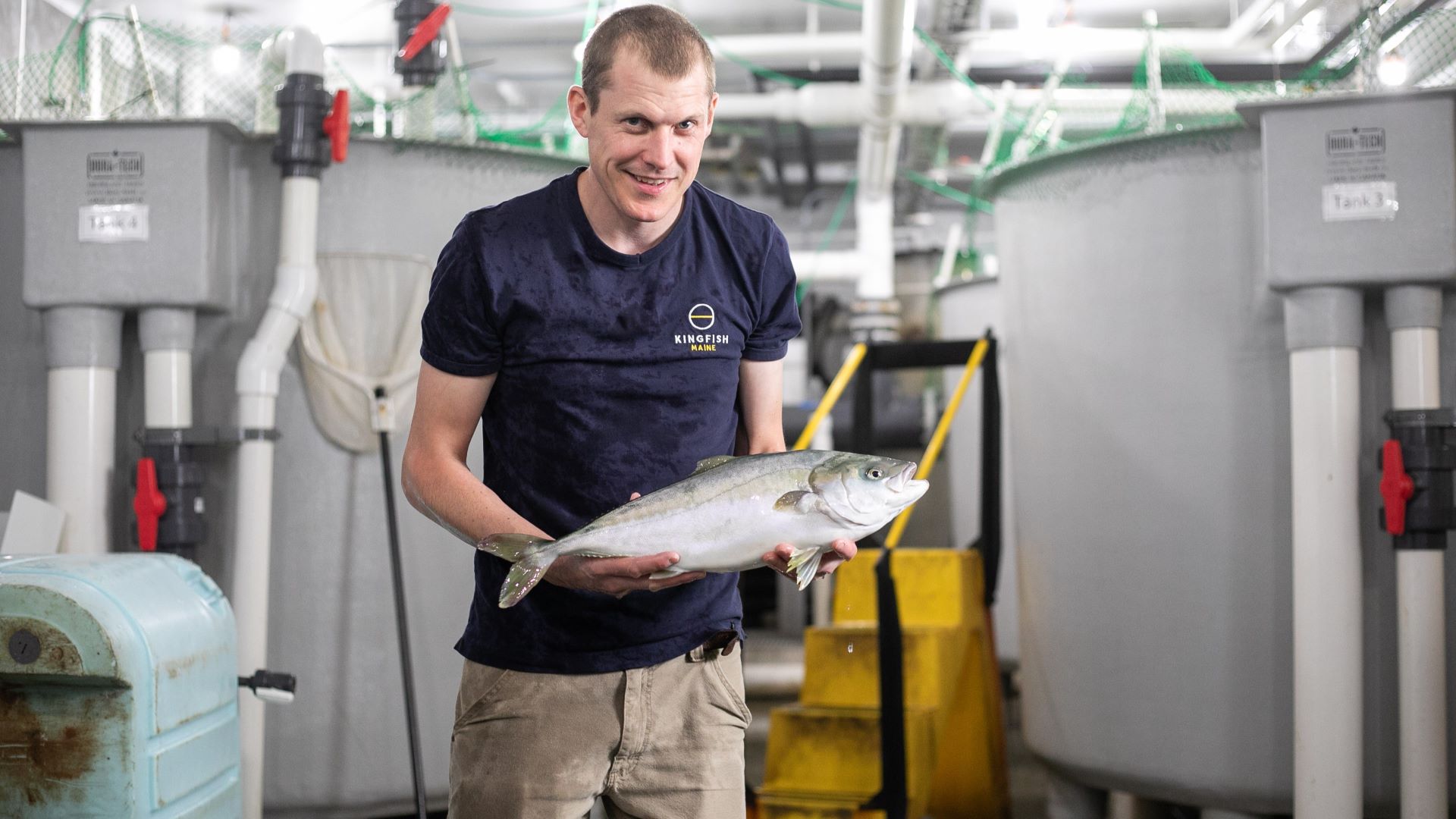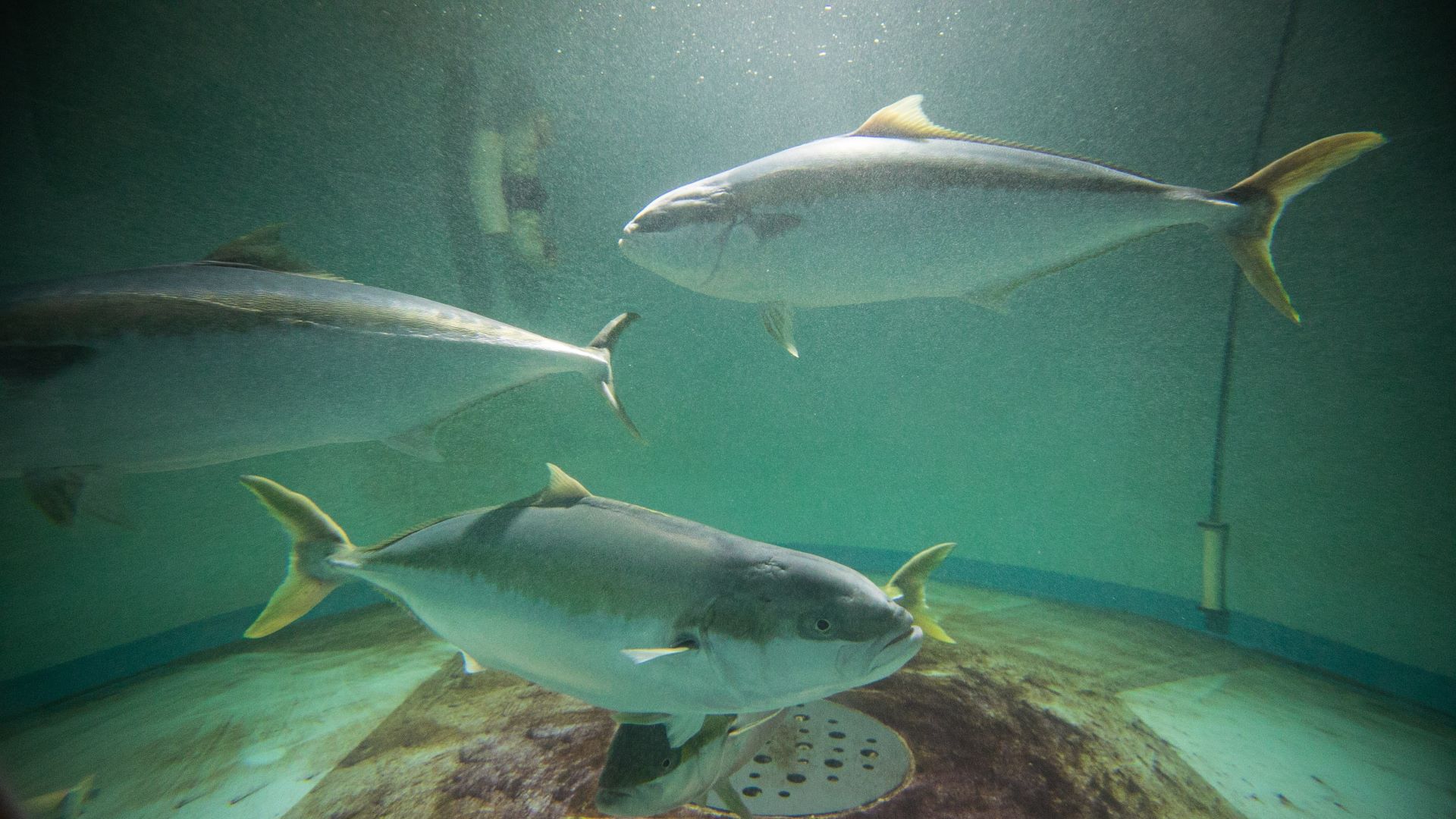Kingfish Maine, the company behind a proposed aquaculture facility in Jonesport, received $4 million from the state last month while appeals challenging the project continue to wind their way through the courts.
Though a number of aquaculture projects across the state have stalled in recent years because of pushback from conservation groups, fishermen and coastal landowners, Kingfish Maine remains optimistic it will break ground on a $110 million land-based fish farm next year.
For now, construction on the recirculating aquaculture facility, which the company says will eventually produce 8,000 metric tons of yellowtail kingfish a year and provide between 70 and 100 jobs, is on hold as the Maine Supreme Judicial Court and Maine Business and Consumer Court consider challenges to the group’s permits.
Opponents say wastewater from the operation would pollute Chandler Bay with nitrogen, among other things, and could lead to toxic algae blooms. But Kingfish representatives claim there are multiple safeguards to monitor the effluent going into the bay.
In their appeals of three permits issued by the Department of Environmental Protection in 2021, The Roque Island Gardner Homestead Corporation and Eastern Maine Conservation Initiative raised concerns about the project’s potential impact on the local scallop fishery, effects on the eel grass wetland, the risk of red-tide algal blooms, as well as noise and light pollution.
The DEP permit was upheld in Kennebec County Superior Court last August and is now before the Maine Supreme Judicial Court.
In the coming weeks, the conservation group Protect Downeast and four individuals are due to file briefs in Maine Business and Consumer Court that challenge the Jonesport Planning Board’s decision to grant a permit to Kingfish Maine. The Washington County Superior Court recently transferred the case to the Maine Business and Consumer Court.
Elizabeth Boepple, the attorney representing the parties challenging the permit, said they are on track to file by March 15; the town will then have a chance to respond. Counter-arguments will then be allowed.
Tom Sorby, Kingfish Maine’s project manager, said that in the meantime the company’s efforts in Jonesport are on hold.
“We are waiting for the final resolution in court, and then we will move to break ground next year,” he said.
This means the company will also wait to use the $4 million it received last month.
The money, part of the latest round of allocations from the state’s nearly $1 billion in American Rescue Plan funds, is meant to help finance improvements to the electrical grid. Sorby said the company plans to use the money on a power line that goes from Jonesport to the aquaculture facility and will cost $12 million.
“The $4 million broke my heart,” said Ariana Fischer, a member of Protect Downeast. “The others didn’t get anywhere near the same amount of money. And they are small Maine businesses creating services and promoting homespun businesses in Maine.”
The other five companies receiving grants were Five Pillars Butchery in Unity, Heiwa Tofu in Rockport, The Holy Donut in Arundel, Maine Plywood USA in Bingham and Tanbark Molded Fiber Products in Saco, with awards ranging from $42,000 to $1.3 million.
While awaiting the verdicts, Kingfish has grown yellowtail broodstock — which produce the eggs to grow more yellowtail kingfish — in tanks at the University of Maine’s Center for Cooperative Aquaculture Research in Franklin.

The company has harvested 16,000 pounds of yellowtail there, which it has sold to restaurants in Portland and across New England.
Farther down the coast, other aquaculture projects are facing lawsuits, or appear to have stalled or been abandoned.
Nordic Aquafarms, which has faced strong opposition in Belfast since announcing plans to build a $500 million salmon farm on the Little River six years ago, recently reaffirmed its commitment to the site despite ongoing legal challenges.
“We have spent the last several months evaluating alternatives to move this project forward. They address lesser environmental impacts while still maintaining economic value to the city,” Nordic Aquafarms CEO Brenda Chandler said in a Feb. 15 statement. “The alternatives under consideration include footprint reduction, re-evaluating water use and reducing energy consumption.”
In Bucksport, where Whole Oceans proposed building a land-based salmon farm on the site of the former Verso paper mill, Town Manager Susan Lessard said she is not aware of any recent developments and has not heard from the company in quite some time.
She said the company’s permits are active and its taxes are paid, but did not have a sense of the timeline for construction. Whole Oceans did not respond to a request for comment by press time.
In Gouldsboro, American Aquafarms’ application to build an industrial salmon farm in Frenchman Bay was shut down by the Department of Marine Resources in April 2022.
Last June, the property where American Aquafarms intended to build a hatchery, a processing plant and possibly a biofuels plant was sold at auction. Three local businessmen purchased the property and hope to change the zoning category from commercial fisheries to general development.
This month the Department of Marine Resources plans to hold public discussions on aquaculture in five coastal communities: Portland, Belfast, Newcastle, Machias and Ellsworth. The first session will be at 4 p.m. Wednesday, March 6, at Portland High.







